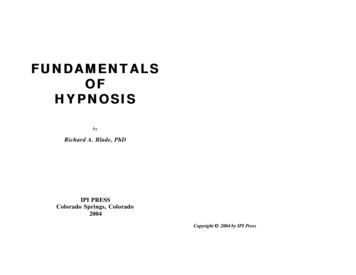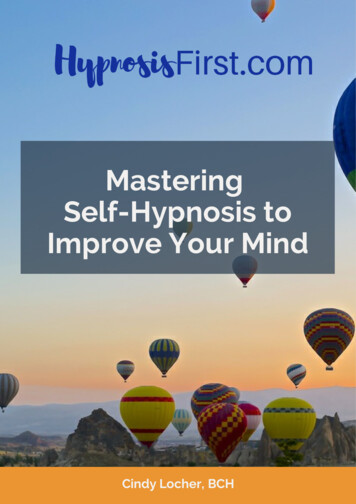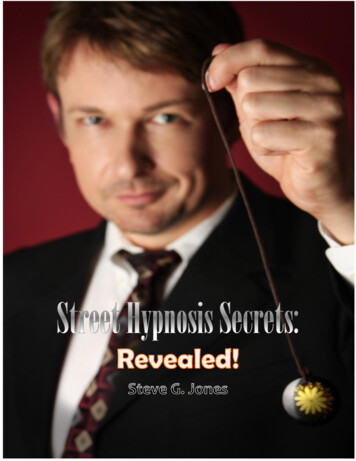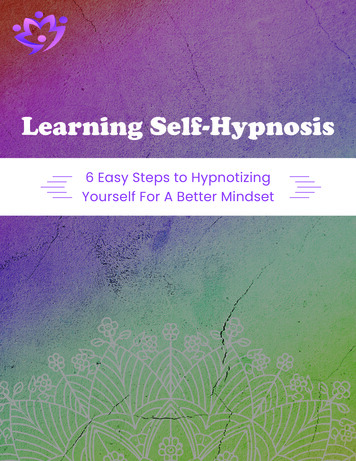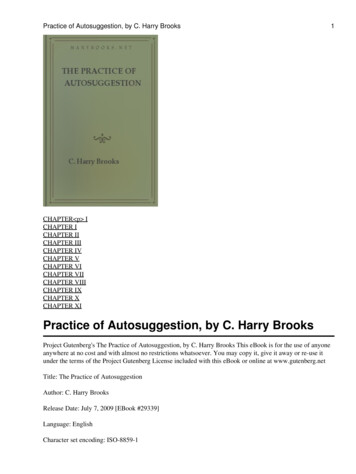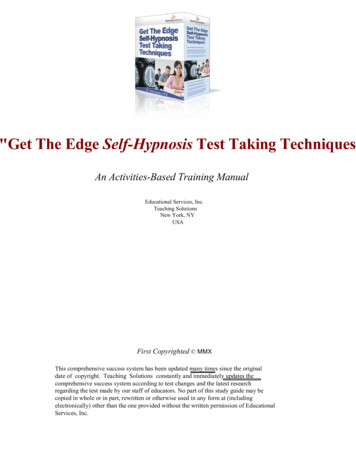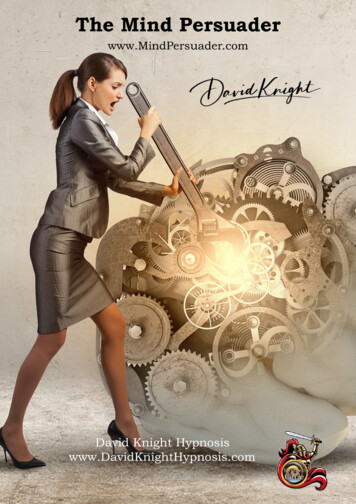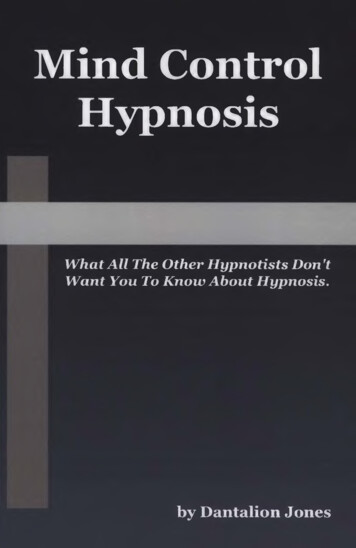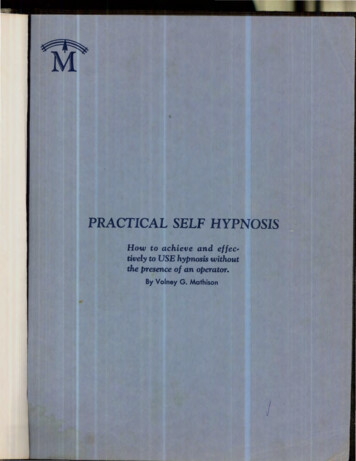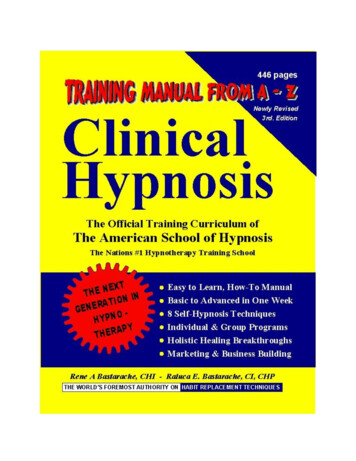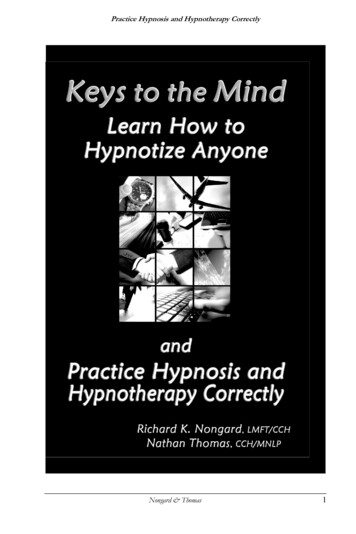
Transcription
1
COPYRIGHT, 1923, BYDOUBLEDAY, PAGE & COMPANYALL RIGHTS RESERVED, INCLUDING THAT OFTRANSLATIONINTO FOREIGN LANGUAGES, INCLUDINGSCANDINAVIANCOPYRIGHT, 1923, BY NORTH AMERICANNEWSPAPER ALLIANCE AND NEW YORK WORLD(PRESS PUBLISHING COMPANY) IN THE UNITED2
STATES, GREAT BRITAIN, CANADA, AND SOUTHAMERICA. ALL RIGHTS RESERVED.Copyright, 1999, By Arthur A. Leidecker, BCHAll rights reserved worldwideCarpentersville, Illinois 60110224-805-6661 email: art@artleidecker.comwww.artleidecker.comISBN # 0-9678582-0-83
My MethodBy Emile Coué4
5
ForewordbyArthur A. Leidecker, BCH,Certified InstructorColorado Registered Psychotherapist Number:13206National Guild of HypnotistsDue to the tremendous successes I’ve experienced with it,I felt a strong need to bring attention to Emile Coué’smethod of auto-suggestion. It is, in my opinion, incrediblybrilliant in its simplicity.Having heard the phrase, “Every day, in every way, I’mgetting better and better,” many people have sought toimprove on it. However if they had read his book, theywould truly understand Coué’s method and realize why itis important to not attempt to improve it by addingspecifics.6
Even Josè Sylva of the world famous Sylva Method, in hisattempt to personalize the phrase, only added an extra“better” to it.The subconscious mind, or our higher self if you prefer,knows what we need. There is no need, in fact it isinadvisable, to add specifics to our auto-suggestion. Theawesome power of the subconscious mind enables it toknow far better than we consciously do, exactly what ourneeds are. Why then should we get in its way? There mayvery well be needs that must first be met, before we caneven begin to work on the needs that we’re aware of.During a particularly troubling period in my life I kept ajournal, faithfully entering my thoughts into it every night.I entered the bad occurences as well as the good things. Igot into the habit of every now and then, reading back intothe pages of my prior week’s entries. Soon it became veryevident to me that many of the “bad” events I wrote about,had triggered “good” things. In fact, many of the goodthings I wrote about could never have happened if the badthing hadn’t occurred first. In no time at all, I becameconvinced that I didn’t really know what was good for me,or what was bad for me.7
What then should I meditate about – or pray for? If I don’treally know what’s good for me, what then should mygoals be? Someone much smarter than me advised, “Justask for knowledge of what is best for you, and as thatknowledge becomes apparent or available, try to actaccordingly.” Then they said, “Just keep doing the nextright thing.”In that light, Coué’s statement makes all the sense in theworld. Even though we may not know exactly what weneed most, our subconscious, or higher self knows, and wecan use that knowledge by keeping the statement simple,and trusting our subconscious for the results.Some hypnotists say that our subconscious mind doesn’tknow the difference between a real or an imaginedexperience. I don’t even begin to buy that theory. I thinkour subconscious mind can operate in dimensions that wehaven’t yet been able to wrap our minds around. We don’tknow exactly how it works, but we have begun to know alittle about how to use it. Some have even said that itdoesn’t respond to negative suggestions – then turn aroundand do “regression to cause” therapy to remove the effectsof past negative impressions.8
Well then, what is your subconscious mind? Smart – ordumb? I believe it’s powerful and awesome, and a longtime ago Coué found a good way to use it.Read on – use it, and watch the results prove it.9
THE REALITY OF AUTO-SUGGESTION10
11
CHAPTER ITHE REALITY OF AUTO-SUGGESTIONI wish to say how glad I was to come into personalcontact with the great American public on their own sideof the Atlantic. And at the same time I could not helpfeeling just a little embarrassed. I had an idea that peopleon that continent expected from me some wonderfulrevelation, bordering on the miraculous, whereas, inreality, the message I have to give is so simple that manyare tempted at first to consider it almost insignificant. Letme say right here, however, that simple as my messagemay be, it will teach those who consent to hear it and to12
give it fair thought a key to permanent physical and moralwellbeing which can never be lost.Autosuggestion disconcerting in its simplicity. To theuninitiated, auto-suggestion or self-mastery is likely toappear disconcerting in its simplicity. But does not everydiscovery, every invention, seem simple and ordinary onceit has become vulgarized and the details or mechanism ofit known to the man in the street? Not that I am claimingauto-suggestion as my discovery. Far from it. Autosuggestion is as old as the hills; only we had forgotten topractise it, and so we needed to learn it all over again.Think of all the forces of the Universe ready to serveus. Yet centuries elapsed before man penetrated theirsecret and discovered the means of utilizing them. It is thesame in the domain of thought and mind: we have at ourservice forces of transcendent value of which we are eithercompletely ignorant or else only vaguely conscious.Power of auto-suggestion known in the Middle Ages.The power of thought, of idea, is incommensurable, isimmeasurable. The world is dominated by thought. Thehuman being individually is also entirely governed by hisown thoughts, good or bad. The powerful action of the13
mind over the body, which explains the effects ofsuggestion, was well known to the great thinkers of theMiddle Ages, whose vigorous intelligence embraced thesum of human knowledge.Every idea conceived by the mind, says Saint Thomas,is an order which the organism obeys. It can also, he adds,engender a disease or cure it.The efficaciousness of auto-suggestion could not bemore plainly stated.Pythagoras and Aristotle taught autosuggestion. Weknow, indeed, that the whole human organism is governedby the nervous system, the centre of which is the brain—the seat of thought. In other words, the brain, or mind,controls every cell, every organ, every function of thebody. That being so, is it not clear that by means ofthought we are the absolute masters of our physicalorganism and that, as the Ancients showed centuries ago,thought—or suggestion—can and does produce disease orcure it? Pythagoras taught the principles of autosuggestion to his disciples. He wrote: “God the Father,deliver them from their sufferings, and show them whatsupernatural power is at their call.”14
Even more definite is the doctrine of Aristotle, whichtaught that “a vivid imagination compels the body to obeyit, for it is a natural principle of movement. Imagination,indeed, governs all the forces of sensibility, while thelatter, in its turn, controls the beating of the heart, andthrough it sets in motion all vital functions; thus the entireorganism may be rapidly modified. Nevertheless, howevervivid the imagination, it cannot change the form of a handor foot or other member.”I have particular satisfaction in recalling this elementof Aristotle’s teaching, because it contains two of the mostimportant, nay, essential principles of my own method ofauto-suggestion:1. The dominating rôle of the imagination.2.The results to be expected from the practice ofauto-suggestion must necessarily be limited tothose coming within the bounds of physicalpossibility.I shall deal with these essential points in greater detailin another chapter.15
Unfortunately, all these great truths, handed downfrom antiquity, have been transmitted in the cloudy garb ofabstract notions, or shrouded in the mystery of esotericsecrecy, and thus have appeared inaccessible to theordinary mortal. If I have had the privilege of discerningthe hidden meaning of the old philosophers, or extractingthe essence of a vital principle, and of formulating it in amanner extremely simple and comprehensible to modernhumanity, I have also had the joy of seeing it practisedwith success by thousands of sufferers for more than ascore of years.Slaves of suggestion and masters of ourselves. Markwell, I am no healer. I can only teach others to curethemselves and to maintain perfect health.I hope to show, moreover, that the domain ofapplication of auto-suggestion is practically unlimited. Notonly are we able to control and modify our physicalfunctions, but we can develop in any desired direction ourmoral and mental faculties merely by the proper exerciseof suggestion: in the field of education there is vast scopefor suggestion.16
From our birth to our death we are all the slaves ofsuggestion. Our destinies are decided by suggestion. It isan all-powerful tyrant of which, unless we take heed, weare the blind instruments. Now, it is in our power to turnthe tables and to discipline suggestion, and direct it in theway we ourselves wish; then it becomes auto-suggestion:we have taken the reins into our own hands, and havebecome masters of the most marvelous instrumentconceivable. Nothing is impossible to us, except, ofcourse, that which is contrary to the laws of Nature and theUniverse.How are we to attain this command? We must firstthoroughly grasp at least the elements of the mechanism ofthe mental portion of what constitutes the human being.The mental personality is composed of the conscious andthe subconscious. It is generally believed that the powerand acts of a man depend almost exclusively upon hisconscious self. It is beginning to be understood, however,that compared with the immensity of the rôle of thesubconscious, that of the conscious self is as a little islet ina vast ocean, subject to storm and tempest.Dominance of the subconscious over the conscious.The subconscious is a permanent, ultra-sensitive17
photographic plate which nothing escapes. It registers allthings, all thoughts, from the most insignificant to the mostsublime. But it is more than that. It is the source ofcreation and inspiration; it is the mysterious power thatgerminates ideas and effects their materialization in theconscious form of action. If we agree that the point ofdeparture of our joys, our sorrows, our ills, our well-being,our aspirations, of all our emotions, is in our subconsciousself, then we may logically deduct that every ideagerminated in our mind has a tendency to realization.Hundreds of examples drawn from little incidents ofeveryday existence enable us to verify the truth of all this.To illustrate action of thought on the emotive faculties wehave but to remember any grave accident or harrowingspectacle of which we have been a witness immediately tofeel the sensations of pain or horror, with greater or lessintensity, according to our individual temperament.Imagine you are sucking a lemon. A simpler andperhaps even more striking example is the classic one ofthe lemon. Imagine that you are sucking a juicy, sourlemon, and your mouth will inevitably and instantaneouslybegin to water. What has happened? Simply this: under theinfluence of the idea the glands have gone to work and18
secreted an abundant quantity of saliva—almost as much,in fact, as if you had actually taken a bite of a real lemon.Again, just think of a scratching pencil being drawnperpendicularly over a slate, and you cannot avoidshuddering and screwing up your face under the shock,while contracted nerves send a shiver from the back of thehead all down your spine.Impossible to separate the physical from the mental.We must therefore realize that it is impossible to separatethe physical from the mental, the body from the mind; thatthey are dependent upon each other; that they are reallyone. The mental element, however, is always dominant.Our physical organism is governed by it. So that weactually make or mar our own health and destiniesaccording to the ideas at work in our subconscious. I meanby this that we are absolutely free to implant whateverideas we desire in our subconscious self, which is a neverflagging recorder, and those ideas determine the wholetrend of our material, mental, and moral being. It is just aseasy to whisper into our receptive subconscious self theidea of health as it is to moan over our troubles; and thosewho do may be certain of the result, because, as I hope Ihave convinced them, it is based on Nature’s laws.19
THE RÔLE OF THE IMAGINATION20
21
CHAPTER IITHE RÔLE OF THE IMAGINATIONBefore beginning to explain the practical applicationof auto-suggestion and the extremely simple method bywhich it is possible for every one to gain complete masteryover his or her physical organism, I must speak of the allimportant rôle of the imagination.Dominance of the imagination over the will. Contraryto the generally accepted theory the will is not theinvincible force it is claimed to be; in fact, wheneverimagination and will come into conflict it is alwaysimagination that triumphs. Try to do something while you22
are repeating: “I cannot do it”—and you will see this truthconfirmed. The mere idea of inability to accomplish athing paralyzes the will power.Self-mastery is attained when the imagination has beendirected and trained to conform with our desires—foralthough, in one sense, the imagination is inclined in thesubconscious, yet it dominates the latter, and therefore, ifwe know how to guide it, our subconscious self will takecharge of our material being and do its work just as wewish it to be done; or, in other words, exactly inconformity with our conscious suggestions.I cannot too strongly insist that in the practice of autosuggestion the exercise of will must be strictly avoided,except in the initial phase of directing or guiding theimagination on the desired lines. This is absolutely theonly manifestation of will necessary, or even desirable.Any other voluntary effort is positively harmful inconnection with auto-suggestion, and will almost certainlyhave an effect contrary to the one desired.Analyze the so-called strong-willed characters ofhistory, Caesar, Napoleon, etc. You will find that theywere all men of big imagination. Certain ideas were23
implanted in their minds, and their tenacious suggestionsimpelled them into action.This, however, is a digression.Law of converted effort. What I want to drive homefor the moment is the law of what my friend CharlesBaudouin calls “converted effort.” Suppose a mansuffering from insomnia decides to try the effect of autosuggestion. Unless previously warned, he will repeat tohimself phrases like this: I want to sleep; I will sleep; I amgoing to sleep. And all the time he will be makingdesperate efforts to coax sleep. That is fatal. The very factof exerting effort has converted the latter into a forceacting in a sense contrary to the original suggestion, withthe result that the poor man tosses and turns in his bed insleepless wretchedness.The imagination should be unhindered. Let theimagination do its work alone, unhindered. Be quitepassive. Through mysterious, still unexplained processes,our subconscious self accomplishes marvelous things.Think of the very commonest movements of the humanbody and ask yourselves how they are operated. What hasset in motion the complicated mechanism when you stretch24
your arm to reach a glass on a table or when you take acigarette from your case? No one knows. But if we cannotexplain the phenomenon we do know that, in actual fact, itis an order resulting from a mere suggestion which istransmitted through the nervous system, and translated intoaction at a speed infinitely greater than that of lightning.Examples of the power of the imagination. Thousandsof examples of the power of imagination may be found inevery-day life. There is the one given by Pascal, and sooften cited, which I cannot help repeating here, because itis such a perfect illustration. No one would have theslightest difficulty in walking along a foot-wide plankplaced on the ground. But put the same plank across astreet at the height of one of your American skyscrapers.Blondel himself would not have dared trust himself on it.Anyone who did would assuredly fall to death. No clearerproof of the power of an idea could be desired. There is,however, another striking example in the impunity withwhich sleep-walkers perform the most perilous feats, suchas wandering about on a roof, hugging the extreme edge ofit, to the terror of their friends who may happen to perceivethem. If awakened suddenly a sleep-walker in such aposition would inevitably fall.25
Here is another. Doctor Pinaud in his book “De laPhilosophie et de la Longévité” relates that in the middleof a large dinner party the cook rushed in to announce thatshe had made a mistake and mixed arsenic with the foodinstead of some other ingredient! Several persons wereimmediately seized with pains and sickness, which onlyceased when the cook came back to say that it was a falsealarm: there had been no such dreadful error!I have said enough to prove the irresistible influence ofthe idea, or imagination, over the physical organism. Itdetermines pain, movement, emotions, sensations. Itseffect is both moral and physical. We may logicallyconclude, therefore, that human ailments, which arenothing but disturbances of the natural equilibrium of allthe elements of our being, can be cured by the right kind ofidea or suggestion.The moral factor in all disease. To begin with, there isin every disease, of no matter what nature, a moral factorwhich no doctor can afford to ignore. Some medicalauthorities in France estimate this moral factor asrepresenting from 40 to 50 per cent of the chances ofrecovery. A patient who says to himself “I am gettingbetter” vastly increases his vital forces and hastens his26
recovery. By gently putting our imagination on the righttrack we are sure of aiding Nature, who manifests herselfthrough the medium of our subconscious self. The instinctof self-preservation is but a manifestation of Nature. At thefirst sound of alarm she hastens to the rescue. A cut fingeror other wound is followed by a rush of red globules to theinjured part. That wonderful subconscious self of oursdoes it. For it knows and commands every movement ofour being, every contraction of our heart, the minutestvibration of every cell in our organism. It is the sublimeinstrument which we are so apt to misuse by allowing bad,disturbing, or discouraging thoughts to interfere with itswork, instead of allowing it to function smoothly andharmoniously.Miracles are attributed to the Fakirs of India. Legendor fact, I know not, but it is certainly true that they dosome most wonderful things simply because they aretaught from their infancy to know and make use of thelimitless unseen and yet unexplained forces latent in us—which can be awakened by thought.The limitations of auto-suggestion unknown. I amoften asked: What are the limitations of auto-suggestion? Ireply: I really do not know. The cures I have seen have27
appeared sometimes so amazing, so incredible, that Idecline theoretically to place any limit at all, although, ofcourse, I must insist, nothing must be expected from autosuggestion which is obviously outside the domain ofmaterial possibilities. For instance, it would be absurd toask for the growth of a new arm or a new leg—despite thefact that the lobster seems to know how to grow a newclaw when it is necessary!There are persons who, by long practice andconcentration, have acquired an amazing power over theirbodily functions. Cases are known to the medical Facultyof Paris of men able to increase at will the speed of theirheartbeats from 90 to 120, or diminish it to such a degreethat the heart seems almost to stop.In another chapter I shall talk of the diseases actuallycured by auto-suggestion, and in general of its sphere ofcurative possibilities. Let it be thoroughly realized thatthought, or suggestion, is able to mould the human body asa sculptor chisels his clay. Thought is an act; it is morethan Bernheim believed when he wrote: “Suggestion is anidea which can be transformed into action.”28
Certain it is that cases declared to be incurable havebeen cured by auto-suggestion. And not only diseases of afunctional nature. Sores and wounds of long standingwhich had resisted all other treatments have been healedrapidly by suggestion. Was it not Doctor Carnot who said“the wounds of victorious soldiers heal more rapidly thanthose of the vanquished”?I can declare without hesitation that whatever theillness, the practice of rational auto-suggestion will alwayseffect an appreciable improvement in the patient’scondition, even if the disease itself be incurable.29
AUTO-SUGGESTION IN PRACTICE30
31
CHAPTER IIIAUTO-SUGGESTION IN PRACTICEAfter the preceding explanations of the theory of autosuggestion my readers are certainly anxious to be initiatedin the method of putting it into actual practice. We haveseen that our physical organism is completely dominatedby our subconscious self which, obeying every suggestion,of no matter what nature, transmits it as an order to everyfibre of the body, and that the latter responds or reactsimmediately. The only obstacle to the perfectaccomplishment of the operation is the intervention of theconscious will or reason at the same time. What we wantto know, therefore, is the mechanism by which we may32
acquire control of our subconscious self—in other words,achieve self-mastery.Simplicity of controlling the subconscious. Themethod is simplicity itself. So simple that it has beenscoffed at, as all simple solutions of seeminglycomplicated problems have been scoffed at. But its logic isirrefutable, and its effects are demonstrated ever day of ourlives.All that is necessary is to place oneself in a conditionof mental passiveness, silence the voice of consciousanalysis, and then deposit in the ever-awake subconsciousthe idea or suggestion which one desires to be realized.Every night, when you have comfortably settledyourself in bed and are on the point of dropping off tosleep, murmur in a low but clear voice, just loud enough tobe heard by yourself, this little formula: “Every day, inevery way, I am getting better and better.” Recite thephrase like a litany, twenty times or more: and in order toavoid distracting your attention by the effort of counting, itis an excellent idea to tick the number off on a piece ofstring tied in twenty knots.33
“Puerile!” Perhaps. Yet it suffices to set in motion inthe desired direction the stupendous forces of which wemay be masters if we will. It is a mere suggestion, but thatsuggestion cast into the mysterious laboratory of thesubconscious self is instantaneously translated into anactive, living force.Like the Oracles of the Ancients. The Ancients wellknew the power—often the terrible power—contained inthe repetition of a phrase or a formula. The secret of theundeniable influence they exercised through the oldOracles resided probably, nay, certainly, in the force ofsuggestion.Yes, my method of self-cure, by auto-suggestion, isundoubtedly simple. It is easy to understand and just aseasy to practise. Yet the human mind is today what it wasin the days of the Oracles: it insists on associating thehealing of the body or mind with complicated theories andprocesses which, in reality, are quite unnecessary. Whycomplain if things are made easy for you?People may wonder why I am content to prescribesuch a general and apparently vague formula as “Everyday, in every way, I am getting better and better” for all34
and every ailment. The reason is, strange as it may seem,that our subconscious mind does not need the details. Thegeneral suggestion that everything “in every way” is goingwell is quite sufficient to set up the procedure ofpersuasion which will carry its effects to the differentorgans and improve every function. I have had remarkabledemonstration of this in the course of my long teachingand experiments. Time and again I have seen patientscured, not only of the particular disease for which theysought relief, but also of minor disabilities which they hadalmost forgotten.Why a general suggestion is better than specificsuggestions. The fact is, our subconscious knows muchmore than we can ever know ourselves about our physicalorganism. Fortunately for us! Just think what a mess weshould make of things if we had to look after everyfunction: breathing, digestion, for instance. Who is it thattakes charge of such a complicated job? The subconsciousmind, and if it ever does its work badly, it is alwaysbecause, in some way or another, we have voluntarilymeddled with it. Every organ or function is connected withand depends in some degree upon others, and if theordinary man or woman were to begin ordering thesubconscious tinkering with a particular organ, he or she35
would certainly be obeyed, only the chances are thatsomething else would then go wrong as a result ofinsufficient knowledge or perhaps complete ignorance ofphysiology on the part of the conscious mind.Don’t concentrate. So just leave it to the subconscious.Avoid all effort. When you recite your phrase “Every day,in every way, I am getting better and better” you mustrelax all strain and tension. Do not seek to concentrateyour thoughts. Concentration is very valuable andnecessary when conscious reasoning is to be done, butfatal to the success of auto-suggestion. Isolate yourselffrom everything likely to distract your attention, however.Close your eyes if possible. You can obtain mentalisolation in a crowd, in a street car, if need be, and there isno reason why you should not practise auto-suggestion insuch conditions in the daytime, always providing yousucceed in putting yourself in the right state ofpassiveness. At the risk of being accused of tediousrepetition, I must insist on the necessity of passiveness andinertia. Do not think you must struggle to impose yoursuggestion. The very fact of making it an effort will bringinto play the conscious will, and that will actually raises abarrier between the subconscious and the suggestion andprevents the latter from penetrating.36
Now, from what I have said of the superiority of ageneral formula of auto-suggestion, it must not be thoughtthat I altogether discourage the application of suggestion tospecific complaints. On the contrary, it is to berecommended unreservedly in all cases, where it is desiredto relieve pain, correct functional disorders, or alleviatetheir symptoms.How to banish pain. For such purposes here is myprocedure: to cause pain to vanish, rub the affected spotlightly but rapidly with your hand, at the same timerepeating in an undertone, so swiftly as to make of it amere gabble the words “ca passe” (pronounce “sah pass”).In a few minutes the pain should disappear, or at the veryleast, be considerably diminished. The reason for gabblingthe words is to avoid the risk of any other extraneous orcontrary thought slipping in through fissures which mightresult from a more distinct but slower diction. For thesame reason I advise English-speaking people to stick tothe French version: it being much easier to say “ca passe”quickly than the longer and more awkward expression “itis passing” or “it is going.”37
How to go to sleep. Sufferers from sleeplessness willproceed in another way. Having settled themselvescomfortably in bed they will repeat (not gabble), “I amgoing to sleep, I am going to sleep,” in a quiet placid, evenvoice, avoiding, of course, the slightest mental effort toattain the desired result. The soporific effect of thisdroning repetition of the suggestion soon makes itself felt;whereas, if one actually tries to sleep, the spirit ofwakefulness is kept alive by the negative idea, accordingto the law of converted effort. Insomnia indeed affords astriking demonstration of the disastrous effect of theexertion of the will, the result of which is just the contraryto the one desired.Stammering, lack of confidence, and paralysis cured.Stammering, again, is a painful affliction which readilyyields to auto-suggestion. I have known cases of curesbeing effected in one sitting, though this, naturally, is rare.What is the cause of stammering? Merely the fear or theidea that one is going to stammer. If you can substitute forthat idea the conviction or the suggestion that you are notgoing to stutter, that if you can say ten words withoutstuttering there is no reason why you should stumble overthe eleventh, then you are cured.38
Nervousness, timidity, lack of confidence, and stillworse, nervous phenomena, can be eradicated by thepractice of auto-suggestion, for they are simply theconsequences of self-suggestion of a wrong, unnaturalcharacter. Those who suffer from such infirmities must setup a different train of suggestions by saying: “I am notnervous; I am well and full of confidence; all is goingwell.” In a fit of anger, try the effect of suddenlymurmuring “I am calm,” and you will be surprised.There are quite a number of cases of paralysis whichare due only to the patient’s belief in his or her inability touse the affected limb or member. They can all be cured,easily, certainly. Implant the notion: “I can walk, I canmove my arm (or leg, or finger),” and the cure isaccomplished. Why? Because, although the lesion whichoriginally produced the paralysis has healed already, thepatient has lost the habit of using his limb, and still thinkshe is unable to do so. It is obvious that, strong as thatsubconscious notion may be in its effects, those of acontrary notion must be equally strong if only thesuggestion can be conveyed to the subconscious mind.That is the whole secret.39
DISEASES THAT CAN BE CURED40
41
CHAPTER IVDISEASES THAT CAN BE CUREDLet us now talk a little about specific diseases whichcan be cured by auto-suggestion.I must repeat what I have said in a previous chapter—that it is very difficult to place any limit to the powers ofauto-suggestion (within the bounds of possibility, ofcourse), for, even in cases
Pythagoras and Aristotle taught autosuggestion. We know, indeed, that the whole human organism is governed by the nervous system, the centre of which is the brain— the seat of thought. In other words, the brain, or mind, controls every cell, every organ, every function of the body. That being so, is it not clear that by means of
